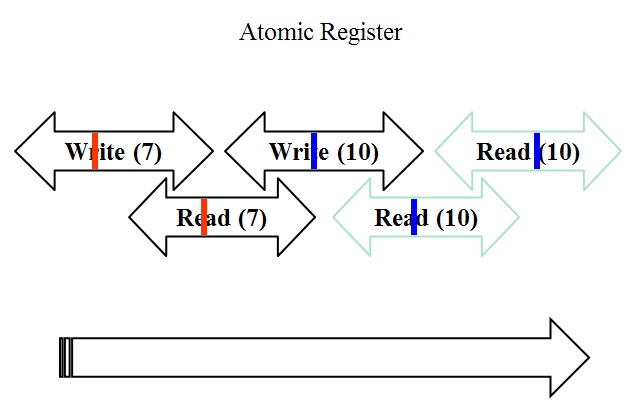A Read-and-write Access to a Shared Variable V Is Said to Be Atomic Iff
Atomic semantics is a type of guarantee provided past a information register shared by several processors in a parallel automobile or in a network of computers working together. Atomic semantics are very strong. An atomic register provides stiff guarantees even when there is concurrency and failures.
A read/write register R stores a value and is accessed by 2 basic operations: read and write(v). A read returns the value stored in R and write(v) changes the value stored in R to five. A annals is chosen atomic if it satisfies the two following properties:
i) Each invocation op of a read or write operation:
•Must appear as if information technology were executed at a unmarried point τ(op) in time.
•τ (op) works as follow: τb(op) ≤ τ (op) ≤ τe(op): where τb(op) and τe(op) betoken the time when the performance op begins and ends.
•If op1 ≠ op2, then τ (op1)≠τ (op2)
two) Each read performance returns the value written by the last write operation before the read, in the sequence where all operations are ordered by their τ values.
Atomic/Linearizable register:
Termination: when a node is correct, sooner or later each read and write operation will complete.
Safety Holding (Linearization points for read and write and failed operations):
Read operation:It appears every bit if happened at all nodes at some times between the invocation and response time.
Write operation: Similar to read operation, it appears as if happened at all nodes at some times between the invocation and response time.
Failed functioning(The diminutive term comes from this notion):It appears as if it is completed at every single node or it never happened at any node.
Instance : We know that an diminutive annals is one that is linearizable to a sequential safe annals.

The post-obit picture shows where we should put the linearization point for each operation:

An atomic register could be defined for a variable with a unmarried writer but multi- readers (SWMR), single-writer/single-reader (SWSR), or multi-author/multi-reader (MWMR). Here is an example of a multi-reader multi-writer atomic register which is accessed past iii processes (P1, P2, P3). Annotation that R. read() → v ways that the corresponding read functioning returns five, which is the value of the annals. Therefore, the following execution of the register R could satisfies the definition of the diminutive registers: R.write(1), R.read()→one, R.write(3), R.write(2), R.read()→two, R.read()→two.

See likewise [edit]
- Regular semantics
- Rubber semantics
References [edit]
- Atomic semantics are defined formally in Lamport'due south "On Interprocess Communication" Distributed Computing 1, 2 (1986), 77-101. (Likewise appeared every bit SRC Enquiry Study 8).
buchananthersom2002.blogspot.com
Source: https://en.wikipedia.org/wiki/Atomic_semantics
0 Response to "A Read-and-write Access to a Shared Variable V Is Said to Be Atomic Iff"
Publicar un comentario